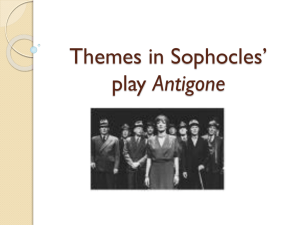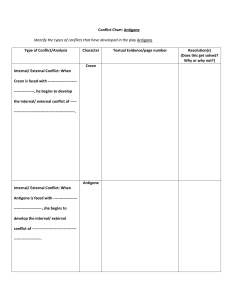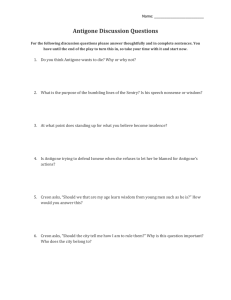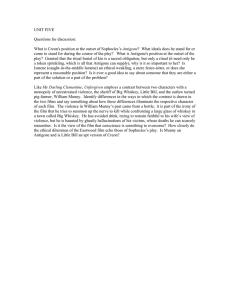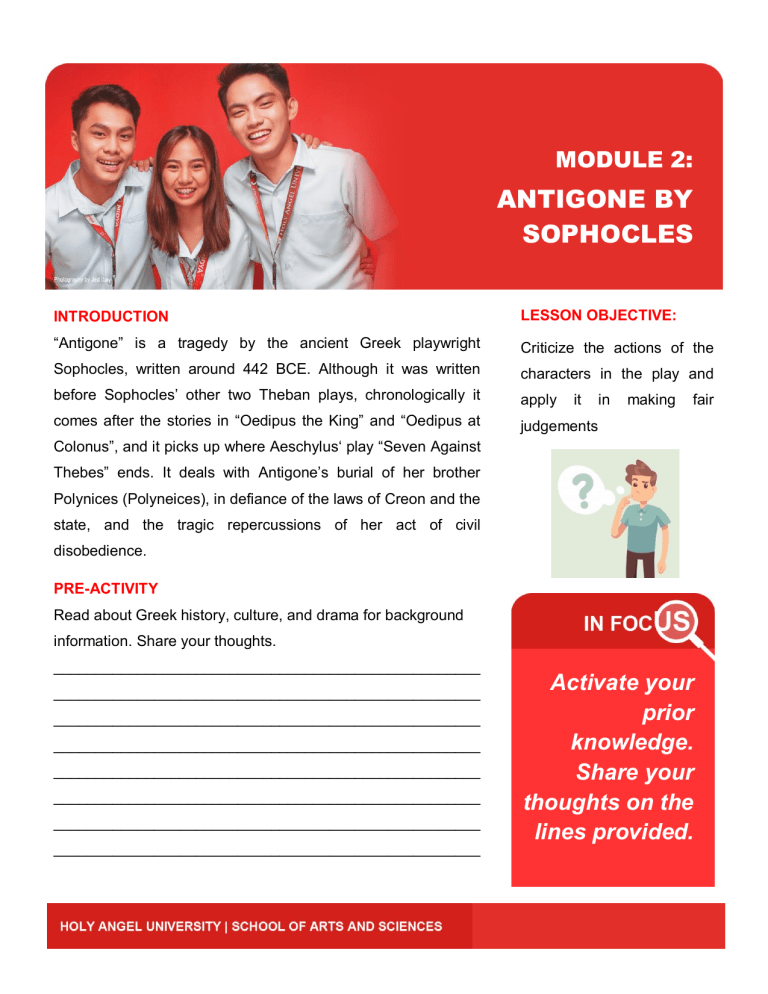
MODULE 2: ANTIGONE BY SOPHOCLES INTRODUCTION LESSON OBJECTIVE: “Antigone” is a tragedy by the ancient Greek playwright Criticize the actions of the Sophocles, written around 442 BCE. Although it was written characters in the play and before Sophocles’ other two Theban plays, chronologically it apply comes after the stories in “Oedipus the King” and “Oedipus at judgements it in making fair Colonus”, and it picks up where Aeschylus‘ play “Seven Against Thebes” ends. It deals with Antigone’s burial of her brother Polynices (Polyneices), in defiance of the laws of Creon and the state, and the tragic repercussions of her act of civil disobedience. PRE-ACTIVITY Read about Greek history, culture, and drama for background information. Share your thoughts. ___________________________________________________ ___________________________________________________ ___________________________________________________ ___________________________________________________ ___________________________________________________ ___________________________________________________ ___________________________________________________ ___________________________________________________ ___________________________________________________ ___________________________________________________ ___________________________________________________ ___________________________________________________ ___________________________________________________ Activate your prior knowledge. Share your thoughts on the lines provided. ___________________________________________________ ___________________________________________________ ___________________________________________________ ___________________________________________________ In Greek legend, Antigone was the daughter of Oedipus and Jocasta. ___________________________________________________ ___________________________________________________ ___________________________________________________ ___________________________________________________ ___________________________________________________ ___________________________________________________ ___________________________________________________ ___________________________________________________ ___________________________________________________ ___________________________________________________ ___________________________________________________ ___________________________________________________ CHARACTERS: 1. Antigone 2. Oedipus 3. Creon 4. Ismene 5. Eteocles 6. Polyneices 7. Haemon 8. Eurydice 9. Teiresias Antigone ABOUT THE AUTHOR: Sophocles, (born c. 496 BCE, Colonus, near Athens [Greece]— died 406, Athens), with Aeschylus and Euripides, one of classical Athens’ three great tragic playwrights. The best known of his 123 dramas is Oedipus the King. Sophocles was the younger contemporary of Aeschylus and the older contemporary of Euripides. He was born at Colonus, a village outside the walls of Athens, where his father, Sophillus, was a wealthy manufacturer of armour. Sophocles himself received a good education. Because of his beauty of physique, his athletic prowess, and his skill in music, he was chosen in Sophocles was the younger contemporary of Aeschylus and the older contemporary of Euripides. 480, when he was 16, to lead the paean (choral chant to a god) celebrating the decisive Greek sea victory over the Persians at the Battle of Salamis. The relatively meagre information about Sophocles’ civic life suggests that he was a popular favourite who participated actively in his community and exercised outstanding artistic talents. In 442, he served as one of the treasurers responsible for receiving and managing tribute money from Athens’ subjectallies in the Delian League. In 440 he was elected one of the 10 stratēgoi (high executive officials who commanded the armed forces) as a junior colleague of Pericles. Sophocles later served as stratēgos perhaps twice again. In 413, then aged about 83, Sophocles was a proboulos, one of 10 advisory commissioners who were granted special powers and were entrusted with organizing Athens’ financial and domestic recovery after its terrible defeat at Syracuse in Sicily. Sophocles’ last recorded act was to lead a chorus in public mourning for his deceased rival, Euripides, before the festival of 406. He died that same year. Sophocles SYNOPSIS OF THE PLAY: The action of “Antigone” follows on from the Theban civil war, in which the two brothers, Eteocles and Polynices, died fighting Creon, furious at this wilful disobedience, questions Antigone over her actions each other for the throne of Thebes after Eteocles had refused to give up the crown to his brother as their father Oedipus had prescribed. Creon, the new ruler of Thebes, has declared that Eteocles is to be honoured and Polynices is to be disgraced by leaving his body unburied on the battlefield (a harsh and shameful punishment at the time). As the play begins, Antigone vows to bury her brother Polynices‘ body in defiance of Creon‘s edict, although her sister Ismene refuses to help her, fearing the death penalty. Creon, with the support of the Chorus of elders, repeats his edict regarding the disposal of Polynices‘ body, but a fearful sentry enters to report that Antigone has in fact buried her brother’s body. Creon, furious at this wilful disobedience, questions Antigone over her actions, but she does not deny what she has done and argues unflinchingly with Creon about the morality of his edict and the morality of her deeds. Despite her innocence, Ismene is also summoned and interrogated and tries to confess falsely to the crime, wishing to die alongside her sister, but Antigone insists on shouldering full responsibility. Creon‘s son, Haemon, who is betrothed to Antigone, pledges allegiance to his father’s will but then gently tries to persuade his father to spare Antigone. The two men are soon bitterly insulting each other and eventually Haemon storms out, vowing King Creon never to see Creon again. Creon decides to spare Ismene but rules that Antigone should be buried alive in a cave as punishment for her transgressions. She is brought out of the house, bewailing her fate but still vigorously defending her actions, and is taken away to her living tomb, to expressions of great sorrow by the Chorus. The blind prophet Tiresias warns Creon that the gods side with Antigone, and that Creon will lose a child for his crimes of leaving Polynices unburied and for punishing Antigone so harshly. Tiresias warns that all of Greece will despise him, and that the sacrificial offerings of Thebes will not be accepted by the gods, but Creon merely dismisses him as a corrupt old fool. Tiresias warns that all of Greece will despise him... However, the terrified Chorus beg Creon to reconsider, and eventually he consents to follow their advice and to free Antigone and to bury Polynices. Creon, shaken now by the prophet’s warnings and by the implications of his own actions, is contrite and looks to right his previous mistakes. But, a messenger then enters to report that, in their desperation, both Haemon and Antigone have taken their own lives. Creon’s wife, Eurydice, is distraught with grief over the loss of her son, and flees the scene. Creon himself begins to understand that his own actions have caused these events. A second messenger then brings the news that Eurydice has also killed herself and, with her last breath, had cursed her husband and his intransigence. Creon now blames himself for everything that has happened and he staggers away, a broken man. The order and rule of law he values so much has been protected, but he has acted against the gods and has lost his child and his wife as a result. The Chorus closes the play with an attempt at consolation, by saying that although the gods punish the proud, punishment Tiresias also brings wisdom. THEMES: Civil disobedience is the refusal to comply with certain laws or to pay taxes and fines, as a peaceful form of political protest. Civil disobedience Fidelity Love for family Description or portrayal of the gods Moral principles REFLECTION To whom do we owe our loyalty – our family or the government? How can an individual make a difference? ___________________________________________________ ___________________________________________________ ___________________________________________________ ___________________________________________________ ___________________________________________________ ___________________________________________________ ___________________________________________________ ___________________________________________________ ___________________________________________________ ___________________________________________________ ___________________________________________________ ___________________________________________________ ___________________________________________________ ___________________________________________________ ___________________________________________________ ___________________________________________________ ___________________________________________________ ___________________________________________________ ___________________________________________________ ___________________________________________________ ___________________________________________________ ___________________________________________________ ___________________________________________________ ___________________________________________________ ___________________________________________________ ___________________________________________________ ___________________________________________________ ___________________________________________________ ___________________________________________________ Pause for a while and reflect on the questions. Share your thoughts on the lines provided.
